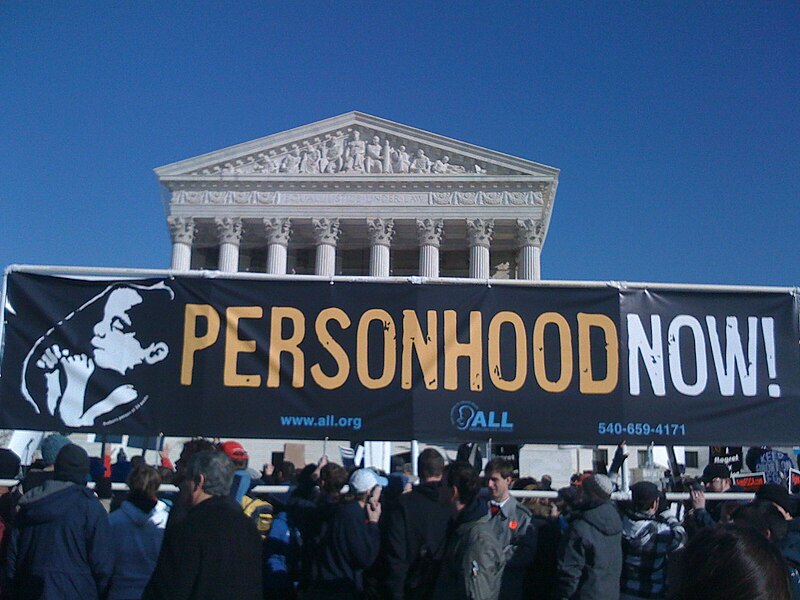Louisiana, Mississippi Fight for Personhood Rights
 Louisiana and Mississippi are in a race to each become the first state to enact a personhood law, recognizing the rights of unborn children as people.
Louisiana and Mississippi are in a race to each become the first state to enact a personhood law, recognizing the rights of unborn children as people.
Anti-abortionists in Louisiana are hopeful that Rep. John LaBruzzo is successful in his fight to make Louisiana the first state in the nation to protect all innocent human beings from being intentionally killed by recognizing the “right to life” for all persons, regardless of age, size or dependency.
Mississippi is also fighting for personhood rights. The Liberty Counsel presented an oral argument Monday at the Mississippi Supreme Court, defending Personhood Mississippi and Mississippi Secretary of State Delbert Hosemann against a lawsuit filed by the ACLU, Planned Parenthood and the Center for Reproductive Rights.
American Right To Life, an organization that “advocates for enforcement of God’s enduring command, ‘Do not murder’ (Luke 18:20),” urged all Louisiana state representatives Tuesday to approve the sponsor’s amendments and to pass LaBruzzo’s bill, HB 645.
“Louisiana has the chance to stop discrimination against the smallest and youngest citizens in America by voting yes on HB 645,” says Lolita Hanks, president of American Right to Life. “Personhood is a legal status all Americans take for granted, yet the unborn are denied it. Now is the time to do what is right, for our own humanity and future generations.”
“The proposed law, HB 645, would protect the right to life of unborn children from fertilization,” says Joe Riccobono, ARTL’s Louisiana spokesman. “It defines feticide as the killing of an unborn child whether surgically or by a lethal drug,” explains Riccobono, who played a leading role in Colorado’s statewide personhood amendment campaigns in 2008 and 2010.
The groups opposing Personhood Mississippi are trying to keep Initiative 26 off the November 2011 ballot, which will include “unborn” in the definition of “person” in the state constitution. The ACLU and Planned Parenthood argue that Initiative 26 violates a ban against initiatives that seek to expand upon or repeal a portion of the Bill of Rights.
Liberty Counsel says there has been no credible evidence to prove that Initiative 26 either seeks to repeal a fundamental right or create a new right; it only seeks to define an existing right. The oerganization maintains that the initiative is legal and that Hosemann should be allowed to carry out his duties under the direction of the voters and the Mississippi Constitution.
Personhood Mississippi, a client of Liberty Counsel, is an organization that is working to prevent abortions by amending the state constitution. The exact wording of the amendment will be: “The term ‘person’ or ‘persons’ shall include every human being from the moment of fertilization, cloning or the functional equivalent thereof.”
Dr. W.A. Krotoski, who has taught at Louisiana State University and Tulane, said while testifying for an earlier version of LaBruzzo’s bill: “From the moment of fertilization, we have all been human. Simply stated, we are all in a virtually seamless process of growth and development; and we are each truly unique, possessing individually-specific DNA—and personhood.”
Krotoski also notes that a human being exists for about five days before implanting in the mother’s womb. During this time is when the baby makes its first cry to the mother, by a pheromone, asking her to get ready to feed the little person.
“The Declaration of Independence declares that we are endowed with the unalienable right to life. That right extends to all humans, including the most vulnerable among us. We must restore the right of all rights for all of us, including the unborn,” says Mathew D. Staver, founder of Liberty Counsel and dean of Liberty University School of Law.
Even with Louisiana’s many abortion regulations, nearly 100,000 children in the state have been killed by surgical abortion in the last 10 years. The rate may even be increasing with the proliferation of chemical abortifacients.
Research conducted by ARTL shows that despite abortions having appeared to decrease, they have actually increased, including by chemical abortifacients. View the findings here.
Although a recent Gallup poll showed that more people now consider themselves pro-choice than pro-life, it also showed that a majority (51 percent) say abortion is “morally wrong,” and 61 percent believe abortion should be legal in “only a few circumstances or no circumstances.” Clearly, Americans are divided—and somewhat confused—on their abortion viewpoint.
“Personhood is where the progress is being made, not in the muddy middle,” Riccobono says.
Dr. Charles Rice, professor emeritus of Notre Dame School of Law, writes: “There is nothing in the decisions of the Supreme Court of the United States which conclusively forbids [any state] to define and protect the rights of the unborn child beyond the extent to which those rights are recognized and protected under the United States Constitution.”




























































